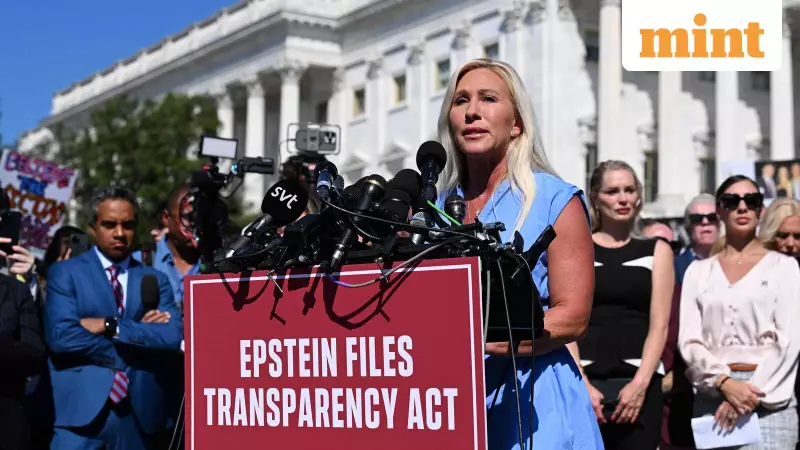
President Donald Trump has launched an aggressive campaign to prevent House Republicans from supporting a measure that would force the Justice Department to release files related to convicted sex offender Jeffrey Epstein. The upcoming vote represents a significant test of Republican loyalty to the president as he attempts to quell rebellion within his own party.
Political Showdown Over Epstein Documents
The House is scheduled to hold a vote this week mandating the disclosure of Epstein-related files after a petition gathered the required 218 signatures, including support from four Republicans. This development occurred despite Trump's efforts to block the measure, setting the stage for a dramatic political confrontation.
While the proposal is expected to pass with unanimous Democratic support and backing from at least some Republicans in the narrowly divided chamber, significant GOP defections could demonstrate the limitations of the White House's influence over congressional members.
The tension escalated dramatically when Trump politically disowned Representative Marjorie Taylor Greene, once considered one of his closest allies, through a series of social media posts. The president labeled her a traitor and a Republican In Name Only while encouraging a primary challenge against her in the 2026 elections.
Republican Infighting Spills Into Public View
Greene, who joined Congress in 2021 and had been an ardent Trump supporter, accused the president of targeting her specifically to intimidate other Republicans ahead of the crucial vote. "He's coming after me hard to make an example to scare all the other Republicans," Greene stated in a social media post last Friday.
In a Sunday interview on CNN's "State of the Union," Greene questioned the resistance to releasing the Epstein files, asking, "That is the question everyone is asking, is, why fight this so hard?"
The measure has been pushed for months by Republican Representatives Thomas Massie of Kentucky and Marjorie Taylor Greene of Georgia, along with Democratic Representative Ro Khanna of California. Khanna, who is hosting an event Tuesday with Epstein survivors alongside Greene and Massie at the Capitol, expressed optimism about Republican support, telling NBC's "Meet the Press" that he is "hoping for 40-plus" Republicans to vote for the measure.
White House Pressure Tactics and Republican Resistance
Trump personally intervened to prevent the petition from reaching the critical threshold, reaching out to the two other Republicans besides Greene and Massie who had signed on—Representatives Lauren Boebert of Colorado and Nancy Mace of South Carolina. According to reports, Boebert was summoned to the White House situation room to meet with Attorney General Pam Bondi and FBI Director Kash Patel regarding the matter.
Despite this pressure, neither Boebert nor Mace withdrew their support. Boebert later told reporters, "President Trump is an amazing man. I stand by him," indicating the complex dynamics at play.
House Speaker Mike Johnson and other Republican leaders have argued against the necessity of the Epstein measure, citing the ongoing work of the House Oversight Committee, which publicly released thousands of additional files last week. Johnson characterized the vote as "a political exercise" that would be "dispensed with this week."
Several Republican lawmakers have already indicated they will support the measure, including Representatives Don Bacon of Nebraska, Andy Biggs of Arizona, and Tim Burchett of Tennessee. Bacon stated on CBS's "Face the Nation," "The train has left the station on this. Let's rip the Band-Aid off and get it done. I wish the president realized that. The more the White House pushes back on this, it just looks bad."
Massie, who has clashed with Trump on Epstein and other issues, revealed that he knows of approximately two dozen Republicans committed to voting in favor of forcing the Justice Department to turn over the Epstein records. He questioned the administration's tactics, specifically referencing Boebert's situation: "Why would you take a member of Congress into the situation room with the FBI director, the attorney general, and try to flip her vote?"
The political drama took a personal turn when Trump targeted Massie's recent marriage, more than a year after his spouse of over three decades died, commenting, "Boy, that was quick!" while calling the representative a loser.
Background and Implications
Trump has repeatedly stated that he cut off ties with Epstein long before the financier's first arrest in 2006. Epstein ultimately pleaded guilty to soliciting a minor for prostitution in 2008. Historical records show that Trump and Epstein socialized together during the 1990s and early 2000s.
Epstein died in jail in 2019 after being arrested a second time and charged with sex trafficking conspiracy. The House Oversight Committee made public more than 20,000 emails from Epstein last week, including messages that reference Trump, though none were to or from the president himself.
The released emails included exchanges with a broad network of wealthy and influential individuals, including Democratic figures and people affiliated with Trump. Officials have emphasized that being mentioned in the emails does not indicate wrongdoing.
If the measure passes the House, it would proceed to the Senate, where its future remains uncertain. The legislation would also be subject to a potential veto by Trump, which would require a two-thirds supermajority in each chamber to override.
The unfolding political drama represents one of the most significant tests of Trump's influence over congressional Republicans since returning to the White House, with implications that could extend well beyond this specific vote.





